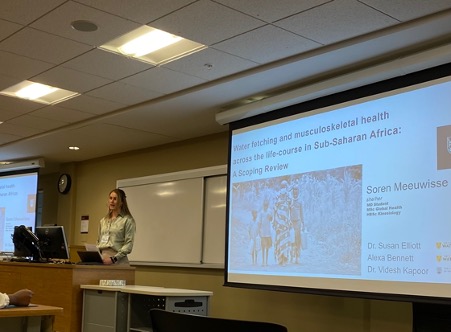Culture’s impact on postpartum depression explored in new study

Refugee women are at high risk of postpartum depression (PPD). How it affects them depends on a number of factors, including culture – their own, as well as their new country’s cultural environment. A recent publication by Global Health program graduate Saarah Haque seeks to explore the ways in which culture impacts how refugee women resettled in high-income countries experience and understand PPD.
PPD is defined as a period of low mood, sadness and guilt within 12 months of childbirth. “For refugee women, cultural diversity adds another layer,” explains Haque. “I wanted to bring focus to culturally distinct and vulnerable populations whose mental health concerns may be misunderstood.”
For the study, which contributes to Sustainable Development Goal 5 – Achieve gender equality and empower all women and girls – Haque aimed to map out the current evidence. She conducted a scoping review that examined 8 studies, and identified four main themes:
- Refugee women from diverse countries understand and experience postpartum depression very differently
- Mental health stigma significantly impacts how these women understand and experience PPD and this, in turn, impacts whether or not they will seek help
- Cultural traditions and social support (from family, and especially other women) can help protect women’s mental health in the postpartum period
- The culture of their new home, the host country, significantly influences how refugee women experience postpartum depression
Haque’s qualitative research captures the unique experiences of women from several countries, including Turkey, Syria, Bhutan and Afghanistan.
“With this scoping review we provide a rich description of the current evidence on the impact culture has on the experience and understanding on PPD in refugee and asylum seeking women,” says Haque, who hopes the research will contribute to future studies that can take into account other important factors like duration of the migration journey, time in refugee camps, time since arrival in the host country and political and economic climate.
“Eventually, we hope research in this area can help inform clinical practice guidelines to aid in the identification and diagnosis of PPD in culturally distinct populations to prevent undue suffering to these women and their families,” she says.
Haque graduated from the MSc Global Health program in 2018 and is currently beginning her third year of medical school at the University of Toronto.
Ruth Adair
Student and Alumni ProfilesRelated News
News Listing

A Journey from Research to Advocacy: Global Health Alumna’s Impact on Health Equity
Student and Alumni Profiles
October 17, 2024

“My work does not only come from a place of intellectual curiosity, but also shared grief”: Dr. Zoha Salam’s Journey as the Second Global Health Doctoral Program Graduate
Global Health News, Student and Alumni Profiles
June 20, 2024

PhD Student Tackling Intimate Partner Violence in Resource-Constrained Settings Receives an IDRC Doctoral Research Award
Student and Alumni Profiles
February 28, 2024
